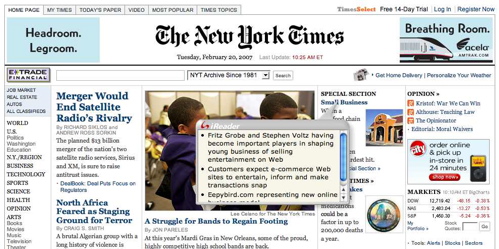But don’t get too excited — it’s just another late-stage deal. Why are we not surprised? Gearworks, as reported by the Pioneer Press, just closed on yet another $21 million in VC, of which our local Split Rock Partners contributed $7.5 million.  The partner on the deal is, of course, Michael Gorman. Yes, that’s a lot of money in a single round for a MN tech firm. And it now means that Gearworks has raised — are you ready? — a total of $59 million since its founding back in 1999. Of course, they blew threw a lot of that cash in a model since adandoned, but they seem to be onto a real market now for location-based services.
The partner on the deal is, of course, Michael Gorman. Yes, that’s a lot of money in a single round for a MN tech firm. And it now means that Gearworks has raised — are you ready? — a total of $59 million since its founding back in 1999. Of course, they blew threw a lot of that cash in a model since adandoned, but they seem to be onto a real market now for location-based services.  It must be a good market, because for this much money to be invested, and now the conservative late-stage guys coming in, there has to be a big payback seen just over the horizon. [IPO?] Well, less so of a payback for the late-stage money, I guess…
It must be a good market, because for this much money to be invested, and now the conservative late-stage guys coming in, there has to be a big payback seen just over the horizon. [IPO?] Well, less so of a payback for the late-stage money, I guess…
But all this big-bucks stuff has little meaning to people in the early-stage investment world, where I know most of us live. For a strange juxtaposition to the above news, check out this video of the latest panel that Guy Kawasaki moderated. It’s amazing how companies today can get launched with so little capital — at least when the Internet is central to what they do. Many of ’em all but thumb their noses at VCs — I hear it all the time. One guy I heard it from recently was Gabe Rivera, founder of Techmeme, chatting with him last month at CES/Bloghaus. What some of these guys are able to do, with such minimal startup funding, is amazing. More power to ’em!
 So, take that Google! It previews the content of a web link without clicking on it — by studying the language, the linguistics, behind it. Pretty heavy stuff, but this team of developers has been working on perfecting this technology for years, so this is certainly no upstart. Perhaps they’re onto an application of it now that will stick, and that the powers-that-be will allow to happen. User acceptance will tell the story, of course, and that’s why reaction in the blogosphere will be big for these guys. Smartly, they’re opening the technology up via open source XML web services, I learned last week.
So, take that Google! It previews the content of a web link without clicking on it — by studying the language, the linguistics, behind it. Pretty heavy stuff, but this team of developers has been working on perfecting this technology for years, so this is certainly no upstart. Perhaps they’re onto an application of it now that will stick, and that the powers-that-be will allow to happen. User acceptance will tell the story, of course, and that’s why reaction in the blogosphere will be big for these guys. Smartly, they’re opening the technology up via open source XML web services, I learned last week.
 I saw this company debut at DEMO last year. They thought widgets were gonna be big….and they were right! The company’s been going great guns since then, becoming an amazing source of every kind of widget imaginable. They partnered with Typepad to introduce this “blidget” (blog+widget) concept. Mine looks like this:
I saw this company debut at DEMO last year. They thought widgets were gonna be big….and they were right! The company’s been going great guns since then, becoming an amazing source of every kind of widget imaginable. They partnered with Typepad to introduce this “blidget” (blog+widget) concept. Mine looks like this: 

 “By publishing open APIs and helpful documentation, they create an active and engaged community and encourage developers to create applications which utilize Yahoo!’s technology in new and innovative ways. With this partnership, Krugle will make it easier than ever to leverage the true potential of Yahoo!’s open APIs and Web Services.”
“By publishing open APIs and helpful documentation, they create an active and engaged community and encourage developers to create applications which utilize Yahoo!’s technology in new and innovative ways. With this partnership, Krugle will make it easier than ever to leverage the true potential of Yahoo!’s open APIs and Web Services.”

Recent Comments